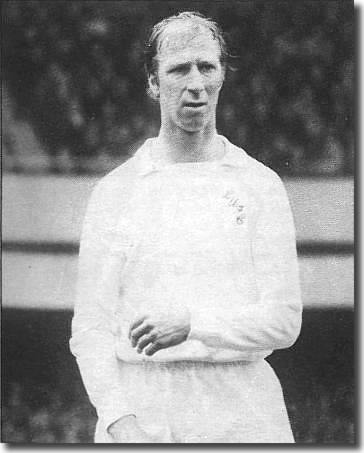 Part
1 Rebuilding from the back - Part 3 The
Revie-Clough wrangle - Part 4 The Revie
for Everton affair - Results and table
Part
1 Rebuilding from the back - Part 3 The
Revie-Clough wrangle - Part 4 The Revie
for Everton affair - Results and table
Fighting back from a two-goal deficit at Crystal
Palace on 18 November to earn a well-merited draw left a sense
more of a point gained than one lost. The fightback lightened
the mood at Elland Road as the Leeds United players prepared for
their League Cup replay against Liverpool four days later.
The game was originally set for two days after the
Palace game, with the winners set to face Tottenham in the fifth
round later the same week. The timescale brought criticism from
both United and Liverpool, but their irritability was assuaged
a little when heavy rain on the day of the game left Elland Road
waterlogged. Referee John Homewood had no option but to call off
the match.
It was just two hours before kick off when the official
took his final decision after inspecting a pitch on which nearly
£40,000 had been spent on a new drainage system and underground
heating over the previous three seasons.
'He found two inches of water lying on it,' United
manager Don Revie said. 'He tried kicking a ball but it was just no
good. No ground could have taken the rain we have had this afternoon.
'We wanted to get this match over and out of the way. We
trained on the practice pitch this morning and it was perfect. Then the
rain started at lunch time and it hammered down. The underground heating
was used during the weekend but that has made no difference for no ground
could have taken this downpour.'
Liverpool manager Bill Shankly: 'It would have been farcical
if we had played. There was nothing anyone could do about it.'
The game was rescheduled for the Wednesday evening,
when the two sides played out a thrilling contest.
Eric Todd in The Guardian: 'Nothing seemed more certain
than extra-time and a second replay last night. Then, with everyone on
the ground, except possibly the players, looking forward to an additional
half hour's hard slog, Charlton,
passing back, failed narrowly to put the ball into his own net. Leeds
were still shaken visibly when Heighway took the corner, a wicked one
at that as the ball curled in, and Keegan, leaping higher than anyone
else, headed a superb goal. The whistle was blown for the last time seconds
later.
'Any side which misses a penalty in a first class match
or on a public park scarcely deserves to win. When the kick is taken by
Giles, of all people, a miss becomes something of a phenomenon. On the
other hand, it should never have been a penalty in the first place and
Liverpool rightly protested against the award in the fifty-fourth minute.
'Smith did no more than obstruct Bremner, for which an indirect
free kick should have been awarded. The referee consulted a linesman but
stuck to his decision. Giles hit the crossbar with his kick and soon afterwards
he was carried off with a knee injury. Troubles indeed never come as single
spies but in battalions.
'Leeds nevertheless were rather unfortunate to lose. They
did nearly all the attacking and combined more quickly and to better purpose
than did Liverpool. Bremner and Hunter were generous providers and frequently
took part in United's attacks.
'But Liverpool defended magnificently, none doing better
than Lindsay and Hughes, the latter of whom was booked for a foul on Bremner.
Smith also had his name taken for questioning one of the referee's decisions.
back to top
'In the second half, Leeds pressed harder than they had
done in the first, and it seemed to be inevitable that they would score.
It appeared to be no less obvious that they could even afford to miss
a penalty. Jones drove the ball over the crossbar after a perfect pass
by Giles; Lorimer missed by inches, Jones headed over the bar from Lorimer's
centre; and Clarke wove clever patterns in the Liverpool penalty area
and reduced his opponents to something near embarrassment which was an
achievement in itself.
'But the ball would not go in the net at either end - until
those last seconds. It was not to be estimated to what extent the Leeds
rhythm was affected by Giles' retirement 15 minutes from the end (Jordan
took his place), but the feeling persisted that Giles might have inspired
Leeds to score a goal. Certainly he would not have slackened his attempts
to compensate for his lapse.'
It was a bitter disappointment for Leeds, especially
as Giles' calf strain kept him out of action for a month.
He joined Eddie Gray on the sidelines, for a medical
specialist had decided the skilful Scottish winger should have
an operation on the chronic thigh problems that had dogged him
all season.
Don Revie: 'Eddie has been troubled by this injury for a
long time and we have been advised that an operation is necessary… It
is a major operation and he will be in hospital for about a week. I couldn't
say how long he will be out of action.
'It is most unfortunate for Eddie. Had it not been for his
injuries, I am convinced he would already have been a much bigger name
in football. I am still sure that if this operation does the trick he
can still become a bigger name than George Best.
'Eddie's injury, along with that of Terry Cooper, deprives
us of two world class players and two players who are naturally left-footed.'
The unavailability of Giles and Gray offered Mick
Bates a way back into the side, and United rose to the occasion
with a 3-0 demolition of Manchester City on 25 November. It was
never as one-sided a game as the scoreline hinted, however, with
all three goals coming in the final twenty minutes.
The Guardian's Eric Todd: 'In the absence of Charlton,
Gray and Giles, Leeds seldom gave the impression that they will dislodge
Liverpool from the top of the championship table … they exasperated their
supporters by making three or four moves when one would have done perfectly
well. Repeatedly, they arrived in the vicinity of the City penalty area,
and then stopped rather like a man who, having lost his way, decides to
return to the point of departure and start all over again … While Leeds
took their goals well, they were flattered.
'A cheeky free kick by Bremner nearly gave Leeds the lead
in the sixty-third minute and City were still dithering when seven minutes
later Lorimer took a free kick and Cherry, unmarked, headed a good goal.
With five minutes to go, Bremner gave Jones the best pass of the match,
and although Barrett and Donachie forced Jones to lose possession, the
ball ran to Lorimer who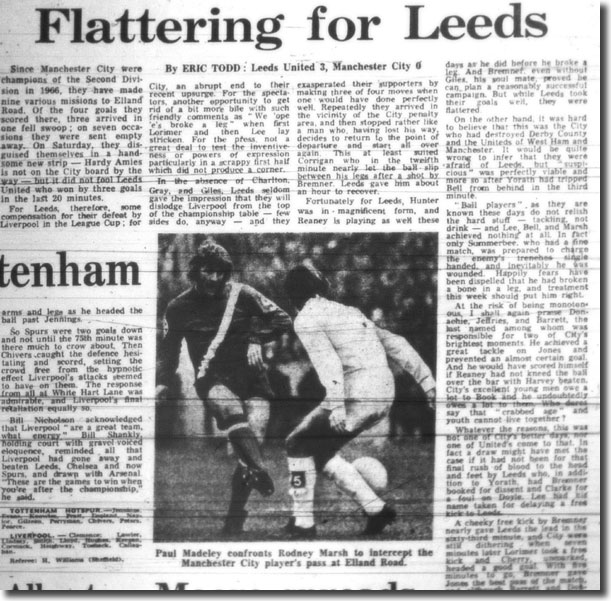 beat Corrigan from an acute angle. In the last minute after another free
kick by Bremner, Clarke completed City's discomfiture with a back header.'
beat Corrigan from an acute angle. In the last minute after another free
kick by Bremner, Clarke completed City's discomfiture with a back header.'
United's steady advance in the First Division was
stayed on 2 December when they lost 2-1 in a bad tempered clash
at Arsenal; in the process the Gunners swapped positions in the
table with their opponents.
United took the lead through a penalty from Lorimer after
19 minutes but a spot kick by Alan Ball brought the Gunners level with
fifteen minutes remaining and in the 81st minute a Radford centre was
palmed into goal by David Harvey to settle the affair. Referee Clive Thomas
booked five Leeds players plus Arsenal's Ball which, according to Don
Warters of the Evening Post, 'left the game with the false appearance
of having been a rough and unsavoury contest. Nothing could be further
from the truth. This was an absorbing contest, fought determinedly by
both sides but without niggle. I cannot recall one real incident in the
whole of the 90 minutes.'
back to top
The Leeds players were annoyed by the cautions, arguing
that referee Thomas had been book happy, but their disciplinary problems
were becoming a major concern. Warters: 'Norman Hunter, who has 16 penalty
points from five bookings, appears before a Disciplinary Commission on
Thursday to appeal against one decision, but even if he is successful
he will still have 12 points against him. That means an automatic suspension
for two matches and in Hunter's case this will put him out of action for
the home game against Birmingham City on December 16 and the away match
against Manchester United on 23 December.
'Revie and most of the United players were upset about the
bookings received at Highbury - and not without some justification. Billy
Bremner, Peter Lorimer, Mick Jones, Trevor Cherry and Allan Clarke were
the names to go into Mr Thomas' black book, but in at least two of the
cases the referee's decision seemed a trifle hasty.
'The cautions picked up by Bremner and Cherry - after Arsenal
had been awarded their penalty in the 75th minute - were the ones I believe
were unkind.
'Bremner, who is captain of the side, did not jostle the
referee and said afterwards that all he did was to ask the official to
have a word with a linesman who had flagged momentarily for an earlier
infringement.
'I did not see Cherry get himself involved, and the player
was at a loss afterwards to see just why or for what he had been booked.
'Cherry's booking, coming so soon after he had won appeals
against two bookings to reduce his points total to nine, must now be over
the mark again, while another player facing the possibility of suspension
is skipper Billy Bremner, who now has three four-pointers for dissent
and one caution in a European match.'
Don Revie in his weekly column in the Yorkshire Evening
Post: 'The number of Leeds United players booked for dissent has become
critical … Five of our players had their names taken at Arsenal recently
- three for disputing the referee's decisions. The offence carries a four-point
penalty under the new disciplinary code and our inability to avoid it
has resulted in Billy Bremner, Trevor Cherry and Allan Clarke facing two-match
bans.
'I have mixed feelings about this business of punishing
players for appealing against decisions which they believe are wrong.
For one thing, dissent is a relatively minor offence and I feel it is
wrong that the penalty is the same as that meted out to a player who commits
a deliberate foul. In addition, I believe all referees should be prepared
to listen to a protest by a team's skipper, providing it is made in a
constructive manner. In fact, we are going to write to the FA, the League
and the Referees' Association suggesting a rule to this effect … I have
now invoked a rule whereby only Bremner is allowed to approach the referee.
Anyone who disobeys will be disciplined by the club.'
The move cut little ice with the authorities - the FA's
Vernon Stokes later proclaimed that the captain had 'no more right to
dispute a decision than any other player'.
On a more positive note, Revie was delighted when
he heard the news that Welsh international keeper Gary Sprake
had asked to be taken off the transfer list.
Sprake had lost his place to long time understudy
David Harvey at the end of the previous season and was transfer
listed at his own request in August when he couldn't regain his
place.
'It is a little early to be receiving Christmas presents,
but this is a very pleasant one,' Revie said. 'I do not like to see anyone
leaving Elland Road, especially when it happens to be a player who has
been with us since he left school. It was a sad day for me when Gary asked
to go, but the lad wanted first-team football and I agreed reluctantly
to his request. His decision to stay is great news.'
Harvey had kept Sprake out of the team with some impressive
form and had broken into the full Scotland side during the season. Being
forced to dangle his heels in the reserves prompted Sprake to request
a move in search of first team football.
The Welshman now told the Evening Post that
the main reason he had decided to stay at Elland Road was the
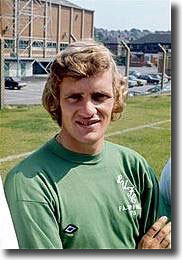 number
of times he had been asked to have second thoughts.
number
of times he had been asked to have second thoughts.
'I have been surprised how many fans have told me they hoped
I would not leave,' Sprake said. 'After talking the matter over with my
wife at the weekend I decided that the best thing to do was to ask to
be taken off the list. United are a great club and I have had nothing
but the best treatment from them. I never really wanted to leave and I
think now that I may have been a little hasty in going on the list.
back to top
'Obviously I still want first team-football and I shall
make an even more determined effort now to win back my place.
'My wife is from Leeds, our daughter Julia has just started
going to school and we are nicely settled in the district. Moving would
have been a big wrench for us all,' added Sprake, who still had five years
to run of a six-year contract.
The next fortnight brought comfortable home victories
for United, 1-0 against West Ham and then by four clear goals
against Birmingham, as they remained hot on the heels of Liverpool
and Arsenal in the table. Their progress was derailed on 23 December,
though, when they were given a stern test by Manchester United
at Old Trafford.
The Reds had recently sacked manager Frank O'Farrell
after a dismal season and Scotland boss Tommy Docherty had taken
his place. The game with Leeds was Docherty's first in charge
and clearly represented a major challenge for a team that lost
5-0 at Crystal Palace a week earlier.
Docherty was a United admirer, saying later, 'They were
all great players … They were so good that I was able to pick four of
them straight away when I became manager of Scotland: Billy Bremner, Eddie
Gray, Peter Lorimer and David Harvey in goal. It was thanks to Don Revie
and Leeds that I had the foundation of the team almost picking itself.'
Docherty had clearly been exploiting his motivational
gifts: the Reds played like men possessed.
Manchester took the lead in the first half through Ted MacDougall
and were fully worth their advantage. But Leeds refused to surrender and
secured a point when Allan Clarke hammered home in injury-time following
a free kick from Johnny Giles, skippering the side in the absence of flu-stricken
Billy Bremner and the suspended Norman Hunter.
Clarke's late goal preserved an unbeaten League
run that now stretched back 12 games to 30 September, when they
had lost at home to Liverpool. The sequence continued on Boxing
Day when they beat Newcastle at Elland Road.
The only goal came after 46 minutes, when Leeds
were awarded a penalty for a foul on Cherry. Newcastle keeper
Iam McFaul saved Giles' spot kick, but the linesman indicated
that the keeper had moved too early and Giles was given a second
opportunity. On this occasion, his effort struck the crossbar,
but as it bounced down, Jordan, who had come on at the break as
replacement for Bates, followed up to head home the rebound.
Joe Harvey, Newcastle's manager, was furious with the referee,
saying afterwards: 'All right, the referee gave a penalty although all
Craig did was slide in for the ball. But the other decision was nonsense.
How can a referee allow himself to be 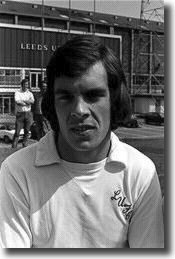 overruled
this way when he was nearer the situation than the linesman? McFaul said
it was a perfectly legitimate save. He moved for the ball after Giles
had shot. Every time we come here we seem to be robbed by a penalty decision.
I don't know how referees can sleep at night when they give decisions
like this.'
overruled
this way when he was nearer the situation than the linesman? McFaul said
it was a perfectly legitimate save. He moved for the ball after Giles
had shot. Every time we come here we seem to be robbed by a penalty decision.
I don't know how referees can sleep at night when they give decisions
like this.'
Don Revie was convinced that the keeper had moved, but Giles
was more equivocal, saying: 'I couldn't see whether he had moved or not.
I never look at the keeper when I am running forward to take a penalty.
I don't think the ball was over the line when Joe moved in to head it
into the net.'
Leeds should have ended 1972 with a trip to West
Bromwich on 30 December, but the club was hit by an epidemic of
flu: ten first teamers, three reserves and a junior came down
with high temperatures, as did Revie.
The Football League gave permission for a postponement,
which offered Liverpool and Arsenal the opportunity to edge further
clear of Leeds. The Anfield outfit beat Crystal Palace at home
to move onto 38 points, while Arsenal's goalless draw at Stoke
took them to 35. United ended the year third on 33 points, enjoying
games in hand on both of their rivals and looking likely to press
their claims strongly in the New Year. But Bill Shankly's Reds
looked in ominously good form, with a single defeat from eighteen
matches.
The Whites' first game of 1973 saw them entertaining Tottenham
Hotspur at Elland Road on 6 January hoping to build on an impressive run
that had seen them secure 20 league points from the previous 26 available.
Peter Lorimer and Johnny Giles had already enjoyed
an early start to the New Year, featuring in a match to celebrate
the entry of the United Kingdom, the Republic of Ireland and Denmark
into an extended European Economic Community. The United forwards
were selected by Sir Alf Ramsey to line up for The Three against
The Six at Wembley and contributed well in a 2-0 victory against
an all-star team that included Franz Beckenbauer, Berti Vogts,
Gunter Netzer, Johan Neeskens and Gerd Muller.
Both men were on duty against Tottenham, but the
flu epidemic brought some selection worries for Don Revie. Nevertheless,
Billy Bremner, Trevor Cherry, Mick Jones and Mick Bates all recovered
well enough to take the field.
United belied any residual effects of the virus, easing
to a comfortable 2-1 victory, as reported by Tom German in The Times.
'Leeds United, despite the aftermath of flu, privations through injury
and, in one or two instances, the almost imperceptible erosions of passing
years, still store within handy reach the elegant style which will deny
even a momentary breather to Liverpool and Arsenal, just above them in
the championship.
back to top
'It was also a setting in which Leeds could harness all
their skills. Here there was no need for systematic, crossfield movement,
probing a wall to test where it might crumble, and Clarke, for one, revelled
in the invitation to dart forward and match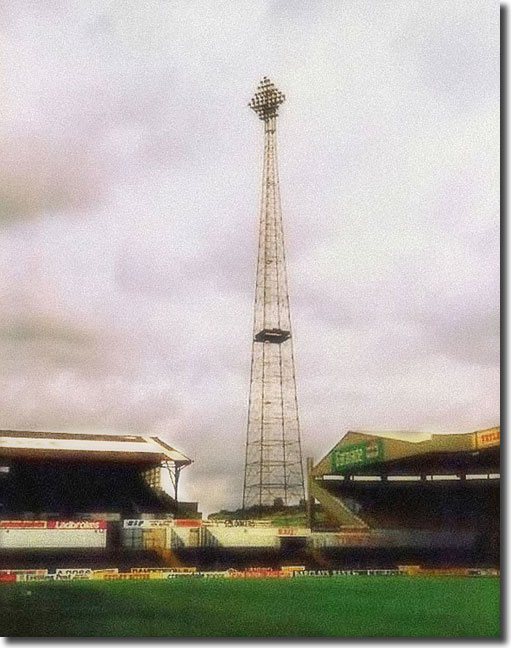 talent against talent, rather than against sheer weight of numbers.
talent against talent, rather than against sheer weight of numbers.
'Giles and Bremner do not always seek each other out these
days to apply the mortar to the bricks but they have a crucial part in
Leeds' building process, nevertheless. Giles had a magnificent first half,
flitting around effortlessly, perceptively lifting passes from one flank
to the other, plopping them immaculately on a length as accurate as any
of those slow left handers Yorkshire has produced in that other, more
leisurely, game so dear to them. Bremner, for his part, excelled at the
pass struck swiftly through the heart of Spurs' defence.
'Leeds' two first half goals were to prove enough. The first
came after a quarter of an hour as Lorimer, winning a corner, placed his
kick just short of the near post where Clarke's delicate headed glance
left the way open for Jones. The second came from a penalty thumped home
by Lorimer after Giles had been in collision with Gilzean, although it
looked less offensive than the nudge Jones had received from England shortly
before.
'All looked secure, but there was an uncomfortable last
20 minutes in store for Leeds as Perryman's continued hard work began
to bear fruit and Peters and Gilzean duly freed themselves more. Knowles
flighted a centre perfectly for Gilzean to head past Harvey only to clip
the outside of a post. Two minutes later, with Hunter stretched out and
shortly to hobble off, the formula was repeated and this time Gilzean
found his target. There the intrusion ended, though; Leeds had earned
the full reward.'
A couple of days later, at the club's 52nd annual general
meeting, chairman Manny Cussins revealed plans to introduce 'the biggest
and best floodlights in the country'. Ground director Bob Roberts told
the Yorkshire Post, 'We have approved a scheme for spending just
over £100,000 to provide entirely new floodlighting for our ground. We
shall be erecting four new pylons 250 feet high, complete with 55 lights
per tower. The pylons will be erected outside the ground in a line with
the goal areas and not at the corners of the ground. Three will be erected
immediately, and there will be 10 additional lights along the West Stand.
The fourth pylon will not be erected until demolition has taken place
at the corner of the Lowfield Road and Elland Road part of the ground.'
During the close season, he added, they 'would be taking down the existing
pylons which should please spectators who have grumbled about sitting
behind pylons'.
The meeting was also told that the successful FA
Cup campaign had helped increase match receipts by £70,000 to
£225,478 and produced a profit of £20,972 for the year to 31 July,
up from £9,499 in 1971.
The benefits of winning the Cup were evident and
United launched their bid to retain the trophy on 13 January,
with a trip to face promoted Norwich City, who had battled their
way through to the League Cup final where they would face Tottenham
on 3 March.
Despite an ultra-competitive display from the Canaries,
United had the edge throughout the contest. The game was marred by 34
fouls with Norwich, recognising the visitors' superior skills, endeavouring
to unsettle them with strong arm tactics.
United took the lead around the half hour, Lorimer
scoring after Jones had robbed Norwich defender Stringer. City
equalised three minutes before the break; centre-forward David
Cross nodded the ball goalwards, only for Reaney to head the ball
out from under the bar. However, referee Gordon Hill ruled that
it had already crossed the line and awarded the score.
Popular opinion had it that United would hammer
Norwich in the Elland Road replay and, indeed, they were all over
them, but they struggled to beat Calcutta-born goalkeeper Kevin
Keelan, who enjoyed the game of a lifetime.
back to top
As is often the case with such one-sided affairs,
the team that was under the cosh broke away against the run of
play to open the scoring. Just before half time Norwich responded
to all the pressure by coming out to snatch the unlikeliest of
goals with Cross again the scorer.
There was the whiff of a shock, but Giles managed
to equalise with twenty minutes remaining. It was a relief to
everyone at Elland Road, but Leeds should have won the game at
a canter for they dominated affairs from the first minute.
The two teams faced each other yet again the following
Saturday, in a League encounter at Carrow Road. This time, United
were in fine form, 2-0 ahead before the break through Jordan and
Clarke and in complete control. Cross scored once more for Norwich,
after 84 minutes, but there was to be no comeback and Leeds emerged
with two points safely in the bag.
On 27 January, United faced Stoke City at Elland
Road. It was a closely-fought encounter, with the only goal coming
after 56 minutes courtesy of Allan Clarke, meeting Yorath's cross
to place an accurate header past keeper John Farmer.
In the closing seconds of the game, David Harvey
made a remarkable reflex save from Potters full-back Mike Pejic.
The defender was so irritated that he inexplicably sought to headbutt
Harvey, though thankfully he was unsuccessful. Referee Harold
Davey had little option but to dismiss Pejic. He had already been
booked, but the incident probably merited a sending off in its
own right.
With Liverpool going down 2-1 at Wolves and Arsenal
held at home by Newcastle, the two points enabled United to narrow
the gap at the top of the table.
| |
Top of Division One - 27 January 1973 |
| |
Pos
|
|
P
|
W
|
D
|
L
|
F
|
A
|
Pts
|
| |
1st
|
Liverpool |
28
|
17
|
7
|
4
|
52
|
25
|
41
|
| |
2nd
|
Arsenal |
29
|
16
|
8
|
5
|
40
|
27
|
40
|
| |
3rd
|
Leeds
United |
27
|
16
|
7
|
4
|
50
|
27
|
39
|
| |
4th
|
Ipswich
Town |
28
|
13
|
10
|
5
|
39
|
28
|
36
|
| |
5th
|
Derby
County |
28
|
13
|
6
|
9
|
36
|
38
|
32
|
| |
|
|
|
|
|
|
|
|
|
Two days later, the Cup marathon with Norwich was
settled at the third time of asking. This time the result was
never in any doubt: Clarke netted a hat trick in the first twenty
minutes and Leeds went on to
complete a 5-0 victory with some of their best football of
the season.
That saw United through to face lowly Plymouth Argyle in
the fourth round five days later. They struggled to an untidy win, as
reported in The Guardian.
'If Leeds United are to continue to justify their ranking
as FA Cup favourites, they will need to improve on their below form display
in defeating Plymouth Argyle 2-1 in the fourth round at Elland Road on
Saturday. The match showed how unpredictable Cup football can be; Leeds
had to struggle to overcome Third Division opponents only five days after
crushing Norwich City 5-0 in a third round replay.
'The refusal of Plymouth to be overawed by the occasion
and their willingness to contest everything accounted partly for the way
the game went. The absence of such players as Bremner and Gray from the
Leeds side was another factor. Without the lead of these talented midfield
players, Leeds were struggling for much of the time, even though they
always looked likely winners.
'Plymouth had done their homework well. They had noticed,
for example, 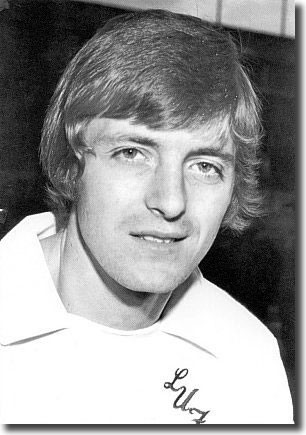 that
Hunter, the iron man of the Leeds defence, prefers to have the ball on
his left side, and so they kept it to the right of him. As a result Hunter
was strangely ineffective, and contributed little to the game. With some
of his colleagues also below par it was perhaps not surprising that Leeds
had a harder struggle than the crowd of 38,374 had anticipated.
that
Hunter, the iron man of the Leeds defence, prefers to have the ball on
his left side, and so they kept it to the right of him. As a result Hunter
was strangely ineffective, and contributed little to the game. With some
of his colleagues also below par it was perhaps not surprising that Leeds
had a harder struggle than the crowd of 38,374 had anticipated.
'It took them 61 minutes to pierce the Plymouth defence,
in which Furnell, a former Arsenal goalkeeper, Provan and Saxton were
commanding figures. Then Clarke, Leeds' most progressive and menacing
forward, scored with a hard shot which Furnell touched but could not keep
out. If Leeds thought that this would open the floodgates, they were speedily
disillusioned. Only five minutes later Plymouth were level through Rickard,
who headed home a centre from Provan on the right as the defence faltered
in both tackling and close marking.
'Another two minutes and the issue was settled. A shot by
Lorimer was charged down and the ball went to Bates, who beat Furnell
with a fierce, low drive.'
The malaise continued a week later at Leicester
with a dismal 2-0 defeat. United clearly missed the direction
and drive of suspended skipper Billy Bremner and had no answer
to a spirited display from Leicester.
That same afternoon the League's top two met at
Anfield and Arsenal emerged with a stunning 2-0 victory over Liverpool,
thus slipping past them at the head of the table.
back to top
An outstanding performance at Elland Road on 17
February by Chelsea's reserve keeper, John Phillips, was mainly
responsible for United being held to a 1-1 draw. It was an opportunity
lost as United's pursuit of the title continued to stutter.
The only positive note on a dismal day was a 15-minute
cameo appearance from Eddie Gray after 14 weeks in the treatment
room. United had badly missed his presence on the left flank,
so it was good news when he reported fit for the FA Cup fifth
round clash with West Bromwich Albion on 24 February.
Revie counselled his men not to be complacent against struggling
Albion, saying, 'They have some first class players and just because they
are bottom of the League, I certainly do not underrate them. Neither must
you.'
In the event, Revie need not have worried for United
never gave Albion a look in.
The Midlanders made a fight of matters in the first
twenty minutes, but did little of note thereafter and were never
at the races once United took a 28th minute lead.
Terry Brindle in the Yorkshire Post: 'Spare a thought
for Peter Latchford, West Brom's goalkeeper. He contributed directly to
his team's downfall with two costly errors. But he will make bigger ones
that matter less. Against a team less aggressive and a striker less nimble-witted,
Latchford would probably have got away with it.
'Clarke, in one of those rapier moods when he looks as though
he could wriggle through a millionaire's wallet, did his damage in a two-minute
spell and spent the rest of the match picking his way nimbly through the
wreckage in deference to calf and ankle strains. 'It is a talent that
genuine goal scorers are born with. While others are watching, they go
in and score,' said Don Revie afterwards.
'Latchford blocked Clarke's header after 28 minutes but
let the 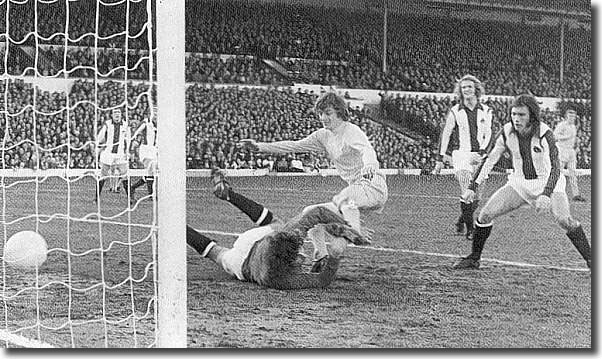 ball
escape his grasp and Clarke hooked it in; he fumbled Lorimer's blistering
shot two minutes later and Clarke bundled in the second. It was all over
bar the exhibition.
ball
escape his grasp and Clarke hooked it in; he fumbled Lorimer's blistering
shot two minutes later and Clarke bundled in the second. It was all over
bar the exhibition.
'That was provided by one Eddie Gray, back in the Leeds
side after injury, recuperating it seems by watching opponents decline
into screaming fits of indecision and impotence.
'It was no small tribute to Gray that the Elland Road crowd,
so often impatient with any but an obvious attacking move, were happy
to savour his bold skills in awed silence. Perhaps it was a mark of respect
for the bewildered Nisbet, who must have been the most relieved man in
Leeds when he was replaced towards the end.
'Nisbet had the red-faced embarrassment of a child confronted
by an exam paper he knows full well he cannot hope to answer. Trapped
with his problem, unable to escape it, powerless to solve it.
'The match stood still as the ethereal Gray taunted and
teased West Brom down the left flank. Possession was all that was required
and Gray never gave the ball away, unless with the slightly bored air
of one condescending to let a team mate have a kick. Sudden burst of speed
to the byline and searching crosses almost brought goals for Reaney and
the ever-industrious Jones.
'Gray and Clarke, quite a combination. Light the blue touch
paper, and stand clear …'
Part 1 Rebuilding from the back - Part
3 The Revie-Clough wrangle - Part 4 The
Revie for Everton affair - Results and table
back to top












 Part
1 Rebuilding from the back - Part 3 The
Revie-Clough wrangle - Part 4 The Revie
for Everton affair - Results and table
Part
1 Rebuilding from the back - Part 3 The
Revie-Clough wrangle - Part 4 The Revie
for Everton affair - Results and table beat Corrigan from an acute angle. In the last minute after another free
kick by Bremner, Clarke completed City's discomfiture with a back header.'
beat Corrigan from an acute angle. In the last minute after another free
kick by Bremner, Clarke completed City's discomfiture with a back header.' number
of times he had been asked to have second thoughts.
number
of times he had been asked to have second thoughts. overruled
this way when he was nearer the situation than the linesman? McFaul said
it was a perfectly legitimate save. He moved for the ball after Giles
had shot. Every time we come here we seem to be robbed by a penalty decision.
I don't know how referees can sleep at night when they give decisions
like this.'
overruled
this way when he was nearer the situation than the linesman? McFaul said
it was a perfectly legitimate save. He moved for the ball after Giles
had shot. Every time we come here we seem to be robbed by a penalty decision.
I don't know how referees can sleep at night when they give decisions
like this.' talent against talent, rather than against sheer weight of numbers.
talent against talent, rather than against sheer weight of numbers. that
Hunter, the iron man of the Leeds defence, prefers to have the ball on
his left side, and so they kept it to the right of him. As a result Hunter
was strangely ineffective, and contributed little to the game. With some
of his colleagues also below par it was perhaps not surprising that Leeds
had a harder struggle than the crowd of 38,374 had anticipated.
that
Hunter, the iron man of the Leeds defence, prefers to have the ball on
his left side, and so they kept it to the right of him. As a result Hunter
was strangely ineffective, and contributed little to the game. With some
of his colleagues also below par it was perhaps not surprising that Leeds
had a harder struggle than the crowd of 38,374 had anticipated. ball
escape his grasp and Clarke hooked it in; he fumbled Lorimer's blistering
shot two minutes later and Clarke bundled in the second. It was all over
bar the exhibition.
ball
escape his grasp and Clarke hooked it in; he fumbled Lorimer's blistering
shot two minutes later and Clarke bundled in the second. It was all over
bar the exhibition.